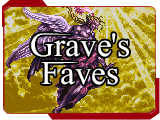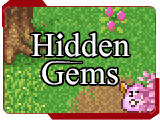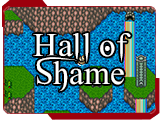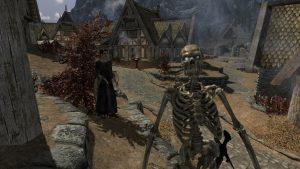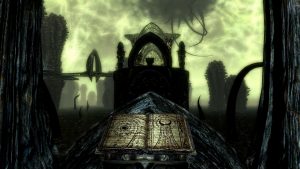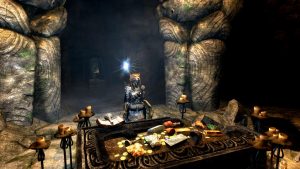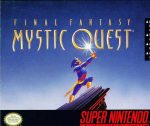Grave's RPG Reviews
Game Boy Advance · Nintendo 2DS/3DS · PC · PlayStation · PlayStation 3
PlayStation 4 · PlayStation Portable · PlayStation Vita · RPG Maker · SNES · Switch · Wii
WiiU · Xbox 360 · Xbox One
The Elder Scrolls V: Skyrim
Oh man, where to even start when trying to review what is likely my favourite game of all time? And for that matter, who hasn’t heard of Skyrim, one of the most successful and popular RPGs of all time? Originally released in 2011 (with the rather iconic release date of 11-11-11), Skyrim — the fifth entry in the long-running Elder Scrolls series — was such a massive success that it was re-released multiple times with various improvements, ported to additional platforms, and still sees a great deal of popularity even today — six years after it was first published.
Essential Information
This Review: PC/Windows (Special Edition, 2011)
Near-Identical Versions: PlayStation 3 (2011), Xbox 360 (2011), PlayStation 4 (2016), Xbox One (2016), Nintendo Switch (2017)
Game Length: 24-130 hours
Critic Rating: 93% aggregateThe aggregate critic rating is based on independent review scores from several other websites.
Grave’s Thoughts
As mentioned above, Skyrim is the fifth entry in the long-running and popular Elder Scrolls series — while the first couple of entries (Arena and Daggerfall) were decent yet hardly mainstream DOS games, the third and fourth games — Morrowind and Oblivion, both of which are worthy candidates for future reviews on this site — were hugely successful and popular, and helped The Elder Scrolls become a well-known name in the gaming world. Skyrim managed to surpass its predecessors and then some — but why is this game so damn popular?
Let’s step back a little and look at the big picture. The Elder Scrolls series are set in the high-fantasy land of Tamriel, and one of the biggest selling points of the series is its open world — from very early in each game, the player is free to do with the world as they wish, whether that be following the main story and completing quests, or simply venturing off and exploring, stealing, murdering — pretty much whatever they like. The world is truly your oyster in The Elder Scrolls, and Skyrim is no exception, giving the player free reign of around 37.1 km² (14.3 square miles) of landscape in the snowy northern lands of the titular land of Skyrim.
It’s pretty much exactly what you’d expect of a high-fantasy world — swords and sorcery abound, a land populated by the hardy men of the north along with a smattering of elves, Argonians (lizard people), Khajiit (cat people), and of course a plethora of monsters, undead, demons, and — naturally — dragons. This is the central core of Skyrim’s plot, in fact — the return of the dragons, a race thought to be extinct for thousands of years. Naturally, the player character has a destiny intricately bound to this plot — he or she is known as the Dragonborn, a mortal born with the power to absorb the souls of slain dragons and learn their ability to ‘shout’ words of mystical power. If you’ve played any previous Elder Scrolls game, you’ll know the drill here — you are the chosen one who will save the world from a great evil, and so on. It’s a bit of a tired and predictable plot, yet the open-world freedom of the game keeps things fresh and entertaining.
The freedom is one of the biggest things that sets Skyrim apart from other RPGs, providing a sort of single-player MMORPG experience, the world itself dynamically adjusting its difficulty level to match that of the player character, ensuring that you’re free to wander just about anywhere, and do just about anything you want, at any point in the game. You can charge off through the (not terribly lengthy) main story quest, join one of the several factions in the game (including the usual warrior, thief and mage guilds), or just strike out on your own and wander into the wilderness, plundering dungeons and defeating bandits and the undead. The choice is yours, and the sheer amount of freedom and flexibility offered by the game is refreshing, as well as incredibly addictive. It’s easy to lose yourself entirely in Skyrim for hours at a time, forgetting that the real world exists at all.
The sense of freedom also applies to the game’s skill system — rather than choosing a class at the start of the game, you simply start off life as a generic adventurer. Any skills you use — for example, wielding a battleaxe will increase your two-handed weapon skill, or casting various spells will increase your aptitude in that field of magic — will increase over time, and after enough skills improve, you can level up and invest a perk point into one of numerous skill trees — one for each skill in the game. This way, you can choose to specialize, to mix and match a few different skills, or simply be a jack of all trades and advance your character in whatever direction seems fun at the time. There’s a strong overlying feeling of “the choice is yours” to almost every aspect of the gameplay, even down to how you approach obstacles in the world — do you charge into the bandit-infested tower with heavy armour and a greatsword, or maybe take the stealthy approach, sniping individual bandits from afar with your bow? Perhaps raise corpses to fight in your stead, letting each slain foe add to your undying legion?
As if that wasn’t enough, we come now to the greatest strength of Skyrim, and likely one of the major reasons why it became so popular: modding. The game fully supports player-made mods, and at the time of writing, there are literally tens of thousands of different mods available for the game, allowing you to customize and extend the world in ways that you may have never thought possible. Everything from gameplay overhauls to DLC-sized expansion packs are available, most for free, and allow the freedom to customize an already incredible game into something that perfectly suits your own style of gameplay. Graphics overhauls can make Skyrim rival games released this year in terms of visuals, fans of magic will be delighted by the plethora of extra spells made available by fans, and the list goes on, and on. In lieu of rambling too much on the subject, I’ll list some of my personal favourite mods below.
Overall, Skyrim is an experience like no other — a massive open world where the player has the freedom to be whatever they want, and do whatever they want, be it good or evil — or maybe somewhere in between. It’s a world you can truly lose yourself in, and with the huge amount of mods available from the community, it’s a game that will never be the same twice.

Recommended Mods
There are so many amazing mods for Skyrim, it’s impossible to really know where to start — but here’s a few of my absolute favourites. Bear in mind that mods made for the original Skyrim may not be compatible with Skyrim Special Edition, and vice-versa, though many have been ported to both games. The links below are for the Special Edition (SSE) and the Legendary Edition (SLE).
Unofficial Skyrim Special Edition Patch (SSE) / Unofficial Skyrim Legendary Edition Patch (SLE) — These are must-have mods which contain an absolute host of community-made bug-fixes for the game, correcting a staggering amount of mistakes Bethesda never officially fixed.
Alternate Start: Live Another Life (SSE / SLE) — Tired of always starting the game as a prisoner in a wagon, having to sit through the same long scripted sequence every time? No longer! Now you can start as a hunter in the wilds, a necromancer in a secret lair, a bandit in a den of thieves, or one of plenty of other alternate starting points to the game.
Frostfall (SSE / SLE) & Campfire (SSE / SLE) — Feel like adding some realism to your game? Frostfall and Campfire make the cold and snowy landscape of Skyrim into the perilous land it truly is, a place where the unwary could freeze to death in the icy wastes. If survival mods are your thing, these are the absolute kings of Skyrim survival.
Ordinator: Perks of Skyrim (SSE / SLE) — The vanilla perks system is excellent, but Ordinator takes a great system and turns it into something incredible. This mod allows for an unprecedented levle of flexibility when it comes to building a character, with everything from a fully-featured unarmed combat tree to various forms of necromancy, spellswords, rangers, and even bard abilities.
Apocalypse: Magic of Skyrim (SSE / SLE) — The essential spells pack for Skyrim, adding over 150 new spells to give a massive amount of new gameplay options both to dedicated magic-users and those who just use a spell or two on the side.
Imperious: Races of Skyrim (SSE / SLE), Aurora: Standing Stones of Skyrim (SSE / SLE), Thunderchild: Epic Shouts and Immersion (SSE / SLE), Sacrosanct: Vampires of Skyrim (SSE / SLE), Summermyst: Enchantments of Skyrim (SSE) / Wintermyst: Enchantments of Skyrim (SLE) — A number of other mods from the same author as Ordinator and Apocalypse, overhauling and extending other elements of the game with the same level of excellence.
SkyUI (SSE / SLE) — Primarily of relevance to PC players, SkyUI overhauls the interface (especially the inventory) into a much less “console-ized” and much more PC-friendly layout, as well as being a framework that many, many other mods rely upon.



